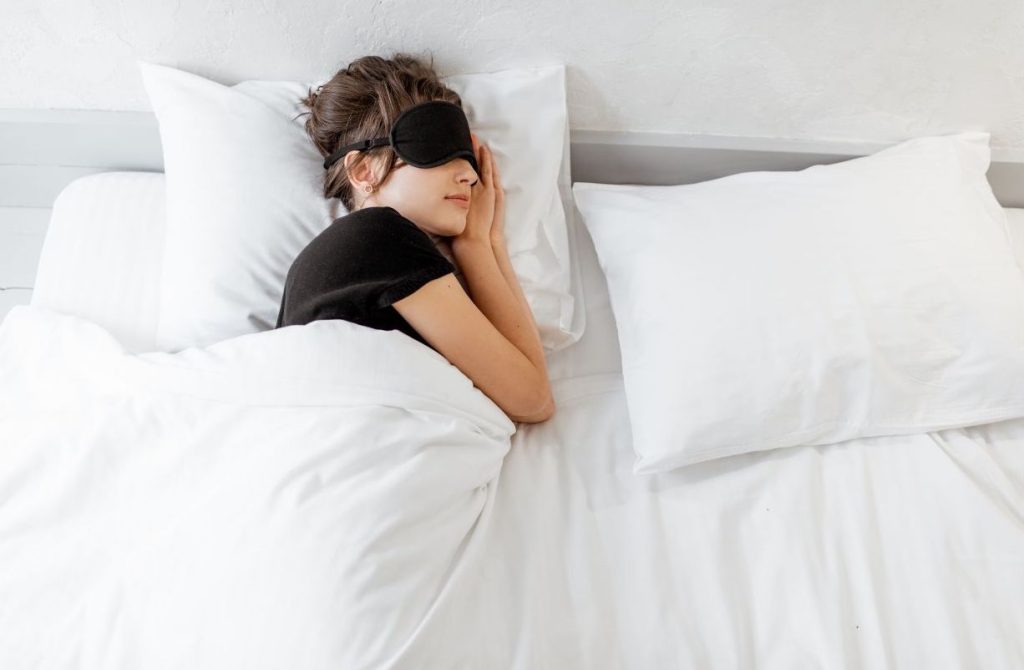People take supplements to improve or optimize their health. So what happens when you look at the label, and the ingredient list is filled with unrecognizable additives?
It’s easy to feel the importance of sleep to our ability to concentrate, function, and interact with others normally during the day. Less observable, however, is the link between sleep and heart health. Irregular or insufficient sleep increases your risk of developing cardiovascular disease [1].
The American Heart Association has stated that an irregular sleep pattern, or one that varies from sleeping seven to nine hours at night, is associated with a long list of cardiovascular risks. These risks include obesity, high blood pressure, diabetes (or poor glucose metabolism), hormonal imbalances, inflammation, and coronary artery disease [1].
Getting less than six hours of sleep is especially hazardous to your heart health. Those who are sleep-deprived tend to have higher levels of stress hormones and inflammatory markers in their blood [1]. Both are also indicators of cardiovascular disease risk [1].

What is cardiovascular disease?
Cardiovascular disease is the leading cause of death in the U.S. and kills 1 in 4 Americans [2]. As such, it is important to be aware of what cardiovascular disease entails, and which types you have control over.
“Heart disease” and cardiovascular disease are two terms for the same group of health problems. Both are illnesses that affect the heart’s ability to distribute oxygen and nutrients throughout your body via the circulation. The risks of suffering from some types of heart disease can be controlled by diet and lifestyle (including healthy sleep). But, you may be genetically predisposed to certain issues, and others still can happen at random.
Cardiovascular disease can include, but is not limited to:
- Congenital heart disease – a heart abnormality that has existed since birth. Abnormalities could be a hole between heart chambers, a blockage or obstruction of blood flow through the heart, or another defect that affects the delivery of oxygen to the rest of the body (not associated with lifestyle choices).
- Arrhythmia – the rhythm of the heartbeat is irregular, too fast, or too slow.
- Coronary artery disease – physical damage has occurred in the major blood vessels connected to the heart, or plaque has narrowed the walls of arteries sacrificing their integrity.
- High blood pressure – blood pushes against the artery walls of the heart with more force than what is healthy or can be sustained.
- Cardiac infarction (also known as a heart attack, myocardial infarction, or coronary thrombosis) – the heart stops beating due to muscle damage, causing loss of pulse and blood flow, and consequently quickly deprives the body and brain cells of necessary oxygen.
- Congestive heart failure – a chronic inability of the heart to pump blood in a normal and healthy way.
- Peripheral artery disease – vessels that flow to the limbs and peripheral body have narrowed or are inefficient.
- Stroke – blood and oxygen flow to the brain is restricted, causing brain damage.
How much sleep do I need for a healthy heart?
Different types of cardiovascular disease may be associated with missing certain parts of the sleep cycle or sleep times. Generally, seven to nine hours, at night, is what’s recommended for sleep and heart health by the CDC [3].
Be advised, too much sleep can also be detrimental to your health. CNN reported results of a study showing that the risk of cardiovascular disease increased by 14% for people who sleep more than 9 hours, and 41% for people who sleep more than 10 hours per night [4].
Age, Sleep, and Heart Health
The CDC has outlined that sleep recommendations are higher for adolescents and older adults than for those of middle age. Adolescents are not immune to the health consequences of under-sleeping. In fact, the National Sleep Foundation reported that adolescents who didn’t sleep well were at greater risk for developing cardiovascular problems [5].
Under-rested adolescents have higher cholesterol levels, a higher body mass indices, larger waist sizes, higher blood pressure, and an increased risk of hypertension [5]. All of these measurements are risk factors for cardiovascular disease. It is easy to see how poor sleep habits at a young age can set a person up for health problems throughout life.
Sleep Quality
Unfortunately, it may not be the quantity of sleep you’re getting that affects your heart health, but the quality. The American Heart Association reports that time spent in slow wave sleep (SWS) is a predictor of cardiovascular health [6].
SWS is one of the deeper stages of non-rapid eye movement (non-REM) sleep. It can be measured by an electroencephalogram and is represented by relatively slow, synchronized brain waves called “delta activity”. In one study, participants with the lowest SWS numbers had an 80% increased risk of developing high blood pressure [6].
How can I get more (and better quality) sleep?
Good sleep habits are sometimes referred to as good “sleep hygiene”, and generally it means setting yourself up in the healthiest way to get a good night’s rest.
If you are getting yourself into bed at an early enough hour to sleep seven to nine hours before your wake-up alarm, and still find you aren’t getting enough restful sleep, the National Sleep Foundation has a few behavioral recommendations for things to try. For example, they suggest trying to stick to the same sleep schedule every single night, regardless of workdays or weekends.
Inconsistency in your sleep schedule may be interfering with the circadian rhythm and hormonal cycles that help you to feel sleepy before bed and wakeful in the mornings [7]. Resist napping if it means you won’t sleep through the night, and try to exercise daily to make sure both your mind and body are ready for rest at bedtime.
Winding Down
You may have heard that the brain needs to wind down before sleep, that you should follow a relaxing routine, and that electronics should be avoided in the hour before bedtime, but you should also resist your phone and tablet if you wake during the night. The blue light that emanates from your electronic devices actually activates the brain, and will likely keep you up longer [7]. Instead, grab a book (bonus points if it’s boring) and read with a dim light on in another room until you feel the sleepiness return.
Try cooling your bedroom at night (between 15.5 – 19.5 degrees celsius), keeping it dark (consider blackout curtains), and listening to white noise (a fan, sound machine, or smartphone app) to best prepare your space for sleep.
Eat Well to Sleep Well
Complementary to healthy sleep routines is healthy sleep nutrition. The National Sleep Foundation also says “healthy eating leads to healthy sleeping”. Of course, the opposite seems to be true too.
Low SWS times are not only associated with high blood pressure but also with diets low in fiber and high in saturated fat [8]. Too much sugar is associated with more middle-of-the-night wakefulness [8].
People with body fat percentages in a “healthy” range are also less likely to experience sleep difficulties like sleep apnea, restlessness, or insomnia, and less likely to fight sleepiness during the day [8]. Therefore, working to stay within a healthy body fat range for your sex, age, and body type may be key to improving your sleep.
Eating a balanced diet, rich in whole, fresh foods and B vitamins may not only help you reach and maintain a healthy body weight, but it will also likely help you sleep.
Sleep Nutrients
B vitamins are directly related to the natural production of serotonin and melatonin, the feel-good neurotransmitter and sleep cycle hormones, respectively. Low B-12 levels, specifically, have been linked to insomnia, and B-1 deficiency is related to other sleep disturbances [8,9]. If you’re not getting enough B vitamins from your diet, you may consider adding a B-complex supplement to your nutritional health regimen.
The evidence linking vitamin D deficiency to poor sleep is also growing [9]. Deficiency in this vitamin (which is quite common in the US) has been linked not only to short sleep duration but also to sleep apnea and poor quality sleep [9]. Vitamin D may be tied to circadian regulation, as this hormone is also produced in response to light.
If you still feel like you may need some help drifting off or staying asleep through the night, there are other natural, nutritional changes you can make to promote healthy sleep.
Melatonin supplements can be taken before bed to imitate the natural nighttime surge of melatonin release, encouraging a normal circadian rhythm [10].
Supplemental magnesium may be helpful, as it is commonly lacking in the diet, and is central to physiological processes that help prepare the body for rest [11].
We hope that these tips are helpful for getting some sleep and supporting the longevity of your heart and overall cardiovascular health.
- Harvard Health Publishing. “A good night’s sleep: Advice to take to heart”. Harvard Medical School. September 2017. https://www.health.harvard.edu/heart-health/a-good-nights-sleep-advice-to-take-to-heart
- Felman, Adam. Everything you need to know about heart disease”. Medical News Today. February 7, 2018. https://www.medicalnewstoday.com/articles/237191.php
- CDC. “How much sleep do I need?” 2017. https://www.cdc.gov/sleep/about_sleep/how_much_sleep.html
- WebMD Health News. “Too Much Sleep May Bring Heart Disease, Death Risk”. Health Day. Dec 5, 2018. https://www.webmd.com/sleep-disorders/news/20181205/too-much-sleep-may-bring-heart-disease-death-risk
- National Sleep Foundation, “How Sleep Deprivation Affects Your Heart”. Updated September 22, 2022. https://www.sleepfoundation.org/excessive-sleepiness/health-impact/how-sleep-deprivation-affects-your-heart
- American Heart Association, “Poor sleep quality increases risk of high blood pressure.” Science Daily. August 30, 2011. https://www.sciencedaily.com/releases/2011/08/110829164644.htm
- National Sleep Foundation, “Healthy Sleep Tips”. Updated October 19, 2022 https://www.sleepfoundation.org/articles/healthy-sleep-tips
- Larsen, Janet. “Nutrition and Sleep”. The Sleep Doctor. December 13, 2022. https://thesleepdoctor.com/nutrition/
- Breus, Michael. “The Best Vitamins for Sleep.” The Sleep Doctor. Updated December 13, 2022. https://thesleepdoctor.com/sleep-aids/best-vitamins-for-sleep/
- Fatemeh, Gholami, et al. “Effect of melatonin supplementation on sleep quality: a systematic review and meta-analysis of randomized controlled trials.” Journal of neurology 269.1 (2022): 205-216.
- Abbasi, Behnood, et al. “The effect of magnesium supplementation on primary insomnia in elderly: A double-blind placebo-controlled clinical trial.” Journal of research in medical sciences: the official journal of Isfahan University of Medical Sciences 17.12 (2012): 1161.
Share:
Related Posts

Benefits of Creatine in Perimenopause and Menopause
Written by Maura MacDonald, MS, RD, CSSD | 2025 As we age, the notion is that we will inevitably become weaker. Not as mobile as

Goodbye Pie Chart, Hello Phase 1 Sliders
Written by Allison Smith, ND | 2025 As we usher in a new era of DUTCH testing which leaves behind the concept of the three-way

Introducing the DUTCH Dozen
Written by Kelly Ruef, ND | 2025 Hormone testing can be complex, which is why Precision Analytical developed the DUTCH Dozen, an interpretive framework that

DUTCH Report Enhancements
Written by Hilary Miller, ND | 2025 Precision Analytical have released the newest version of the DUTCH Test. This is the report’s most significant update

Gallbladder Health 101: What It Does and How to Keep It Working Well
Written by Ashley Palmer & Pooja Mahtani | 2025 The gallbladder may not get much attention compared to the gut, but it plays a central

